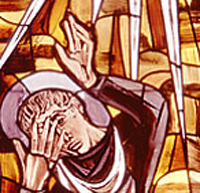MESSAGE OF HIS HOLINESS POPE FRANCIS
FOR THE XXXVI WORLD YOUTH DAY
21 November 2021
“Stand up. I appoint you as a witness of what you have seen." (cf. Acts 26:16)
 Dear young people,
Dear young people,
Once again I would like to take you by the hand and walk with you on the spiritual pilgrimage that leads to the 2023 World Youth Day in Lisbon. Last year’s Message, which I signed shortly before the pandemic broke out, had as its theme: “Young man, I say to you, arise!” (cf. Lk 7:14). In his providence, the Lord was already preparing us for the grave challenge we were about to experience.
Everywhere in the world, we suffered the loss of so many of our dear ones and experienced social isolation. The health emergency was a particular setback for you young people, for your life is naturally directed outwards: to school or university, to work and social gatherings...
The experience showed us our fragility, but it also revealed our virtues, including our inclination to solidarity. All over the world, we saw great numbers of individuals, including many young people, helping to save lives, sowing seeds of hope, upholding freedom and justice, and acting as peacemakers and bridge builders...
Today too, God is saying to each one of you: “Arise!” I fervently hope that this Message may help us prepare for new times and a new page in the history of humanity. Yet we cannot begin anew without you, dear young people. If our world is to arise, it needs your strength, your enthusiasm, your passion. I would like, then, to meditate with you on the passage of the Acts of the Apostles where Jesus says to Saint Paul: “Arise! I have appointed you to testify to what you have seen” (cf. Acts 26:16).
Paul’s witness before the king

The verse that has inspired the theme of the 2021 World Youth Day is taken from the testimony of Paul before King Agrippa following his imprisonment. Paul, formerly the enemy and persecutor of Christians, is now on trial precisely for his faith in Christ. Some twenty-five years later, the apostle recounted the story of his fateful encounter with Christ.
Paul states that he persecuted Christians, until one day while travelling to Damascus to arrest some of them, a light “brighter than the sun” shone around him and his companions (cf. Acts 26:13). He alone, however, heard “a voice”: the voice of Jesus who spoke to him, calling him by name.
Saul! Saul!
Let us take a closer look at this event. By calling Saul by name, the Lord made him realize that he knew him personally. It was as if he said: “I know who you are and what you are up to; even so, I am speaking directly to you”. Twice, the Lord calls Paul by name as the sign of an important special vocation; so he had earlier done with Moses (cf. Ex 3:4) and Samuel (cf. 1 Sam 3:10). Falling to the ground, Saul realizes that he is witnessing a theophany, a powerful divine revelation that throws him into confusion, but does not destroy him. Instead, he finds himself called by name.
Only a personal and non-anonymous encounter with Christ changes lives. Jesus shows that he knows Saul very well, “inside out”. Even though Saul is a persecutor, even though his heart is full of hatred for Christians, Jesus realizes that this is due to ignorance. He wants to show in him his mercy. This grace, this unmerited and unconditional love, will be the light that radically transforms Saul’s life.
Who are you, Lord?
 Before this mysterious presence calling out his name, Saul asks:“Who are you, Lord?” (Acts 26:15)
Before this mysterious presence calling out his name, Saul asks:“Who are you, Lord?” (Acts 26:15)
This question is decisive, and sooner or later all of us have to ask it. It is not enough to hear other people speak about Jesus; we need to speak to him ourselves, personally. Deep down, this is what prayer is all about.
Prayer means talking directly with Jesus, even though our heart may still be confused and our mind full of doubts or even contempt for Christ and Christians. I pray that every young person, in the depths of his or her heart, will eventually ask the question: “Who are you, Lord?”
“I am Jesus, whom you are persecuting!”
With this answer, Jesus reveals to Saul a great mystery: that he sees himself as one with the Church, with Christians. Up to that point, Saul had seen nothing of Christ, but only the faithful whom he had cast into prison (cf. Acts 26:10) and in whose killing he had consented (ibid.). He had seen how Christians responded to evil with goodness, hatred with love, enduring injustice, violence, calumnies and persecutions for the name of Christ. In some way, without knowing it, Saul had already encountered Christ. He had encountered him in Christians!
How many times have we heard it said “Jesus yes, the Church no!”, as if one could be an alternative to the other. One cannot know Jesus if one does not know the Church. One cannot know Jesus apart from the brothers and sisters in his community. We cannot call ourselves fully Christian unless we experience faith’s ecclesial dimension.
To be Coninued


















